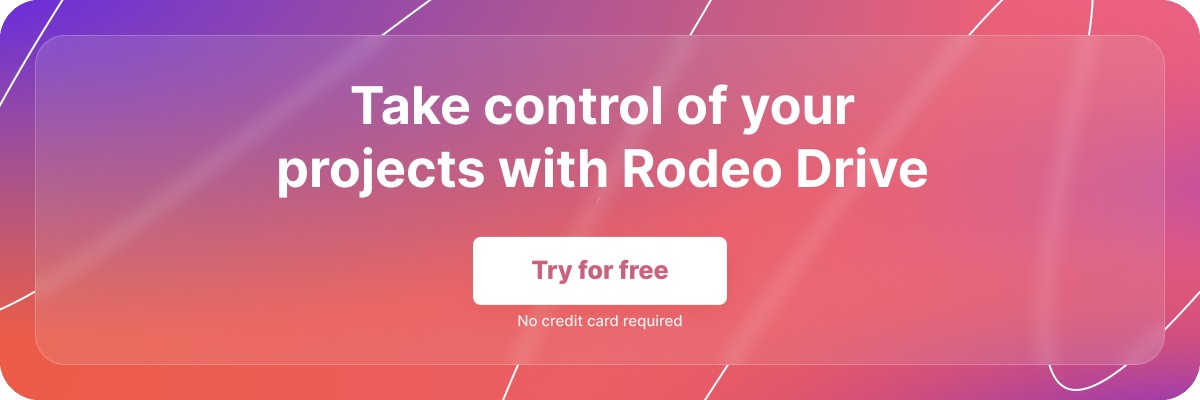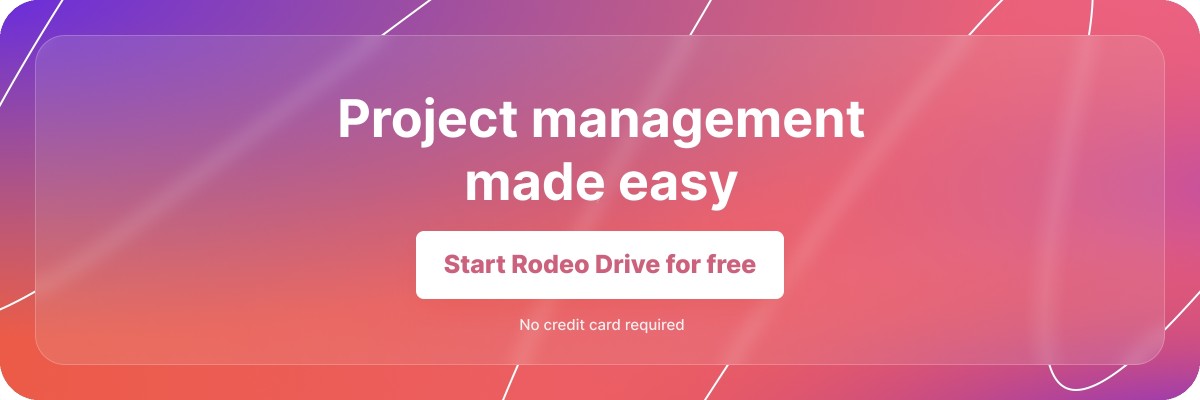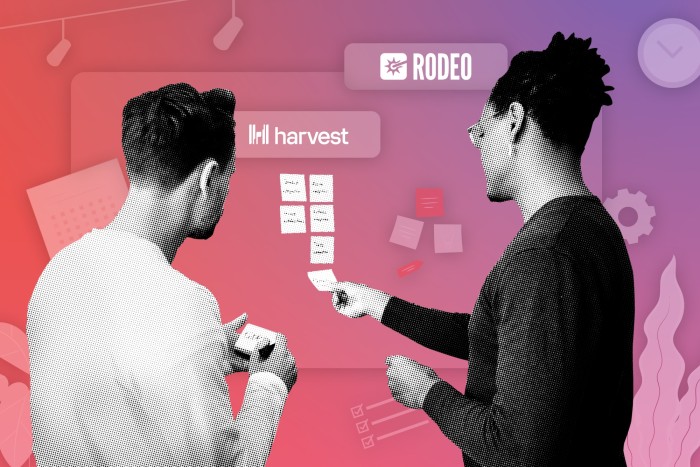The 9 Best Milanote Alternatives for Creative Workflows
A seamless workflow can be the key to unlocking project success in creative endeavours. Milanote has long been a favoured note taking tool among creatives for its intuitive visual organisation.
However, the world of technology is ever-evolving, offering many alternatives that promise to elevate creative workflows to new heights.
In this article, we delve into creative work management, unveiling a collection of the finest Milanote alternatives ready to empower your imaginative process. Whether you're a team of designers, writers, or artists, this exploration will guide you toward the perfect platform to amplify your creative potential.
Why should I look for a Milanote alternative?
Milanote is a digital tool designed for visual organisation, creative collaboration, and project planning. The note taking app provides users with a virtual canvas to create boards and add various types of content, such as images, sticky notes, links, and files, onto customisable cards. This visual approach is useful for brainstorming, planning, and organising ideas.
Milanote is favoured by creative professionals, designers, writers, and other teams that require a visual workspace to capture and arrange their thoughts and inspirations. The platform is often used for tasks like mood boards, storyboarding, content planning, and project management in creative industries. However, while Milanote excels in visual organisation, some users have noted limitations like tracking progress and the overall user interface.
Before we look at the best alternatives on the market, let’s examine some concerns expressed by users on review websites Capterra and G2.
No easy-to-view calendar
Milanote is highly praised for its visual organisation but lacks a built-in calendar feature. Unlike other project management tools, Milanote does not offer the ability to create and manage schedules directly within the platform. Instead, the software provides a visual canvas for organising ideas, tasks, and content through boards and cards.
Users looking for calendar-based project management or time-specific scheduling might need to supplement Milanote with a separate calendar tool to manage their time-sensitive tasks and activities effectively. This review by G2 review underlines this:
"I think it is missing the calendar feature. You can create a template that looks like a calendar and can be used in some way but it's definitely a missing feature."
Clunky interface
The platform's layout and navigation sometimes feel less streamlined than other tools. Users have reported challenges in arranging and resizing elements on boards and difficulties in managing larger projects, which can lead to a cluttered and less user-friendly experience.
While Milanote's visual approach is beneficial for creative projects, its interface limitations may impact its overall usability, especially for those seeking a more polished and efficient workflow like this Capterra review states:
“The structuring of content in layers and "buckets" went so far it became nearly impossible to know where what asset is stored.”
Difficult to track progress
Without dedicated tools for tracking progress, users may struggle to get a comprehensive overview of task statuses, timelines, and completion rates. This can hinder effective collaboration and decision-making, particularly for teams that rely on transparent progress updates.
While Milanote excels in visual brainstorming and content organisation, this reviewer on Capterra finds a progress tracker an important feature to have.
“You can't track the progress of activities in a detailed way, also you can't see how many activities each team member has to do. In the end I understand that Milanote it's not focusing on these things but it would be nice to have them.”
9 Milanote alternatives to enhance your creative projects
Now that we’ve covered the interface and progress tracking concerns that some users have with Milanote, let’s explore the best alternatives out there.
Below is an assortment of the top 9 Milanote alternatives, accompanied by comprehensive insights into their features and pricing.
1. Rodeo Drive
Rodeo Drive is a robust project management tool equipped with multiple features tailored to support your creative workflow while possessing the unique capability to manage the financial aspects of your projects seamlessly.
Rodeo Drive stands as an integrated solution, ending the fragmented workflows that often result from juggling an array of third-party tools. This platform serves as a comprehensive aid, guiding your projects from the initial planning stages all the way through execution.
Let’s have a closer look at what makes Rodeo Drive’s standout:
A clean and structured interface
With its sleek design and intuitive interface, Rodeo Drive provides easy access to all project management features through the top menu bar. The user-friendly interface removes barriers, steep learning curves, and complex onboarding procedures.
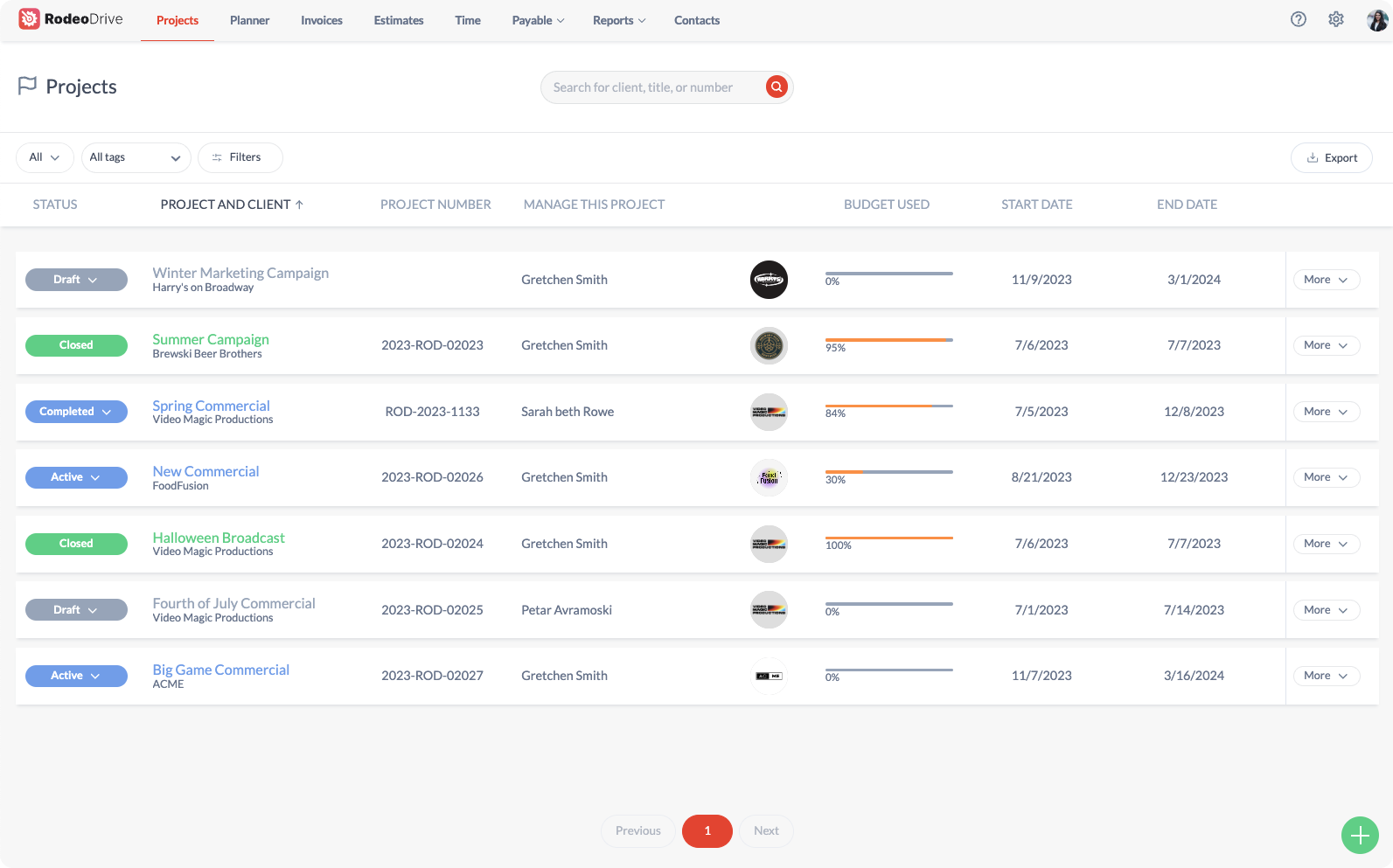
Rodeo Drive’s projects page
Manage your team’s workload
Effective creative project management relies on accurate resource planning and activity scheduling. Rodeo Drive streamlines this through its intuitive timeline-view planner, allowing for efficient resource allocation and preventing burnout.
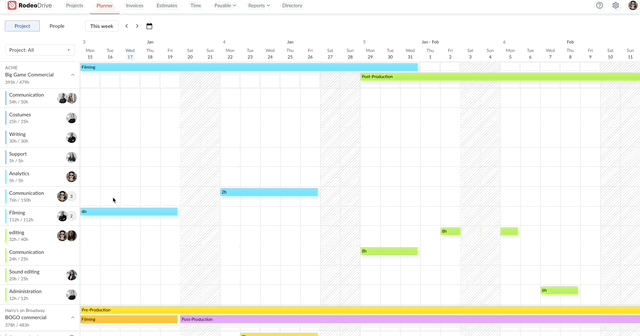
Adding a new project activity in Rodeo Drive
Powerful insights to support your creative business
Sustained learning drives growth. Recognising this, Rodeo Drive offers a robust reporting function for swift project insights, enabling analysis, learning, and adaptable strategies.
Rodeo Drive's project report offers an overview of your finances to keep you informed on your project statuses at a glance. This holistic view lets you evaluate performance quickly, empowering informed decisions and actions for optimised project outcomes.
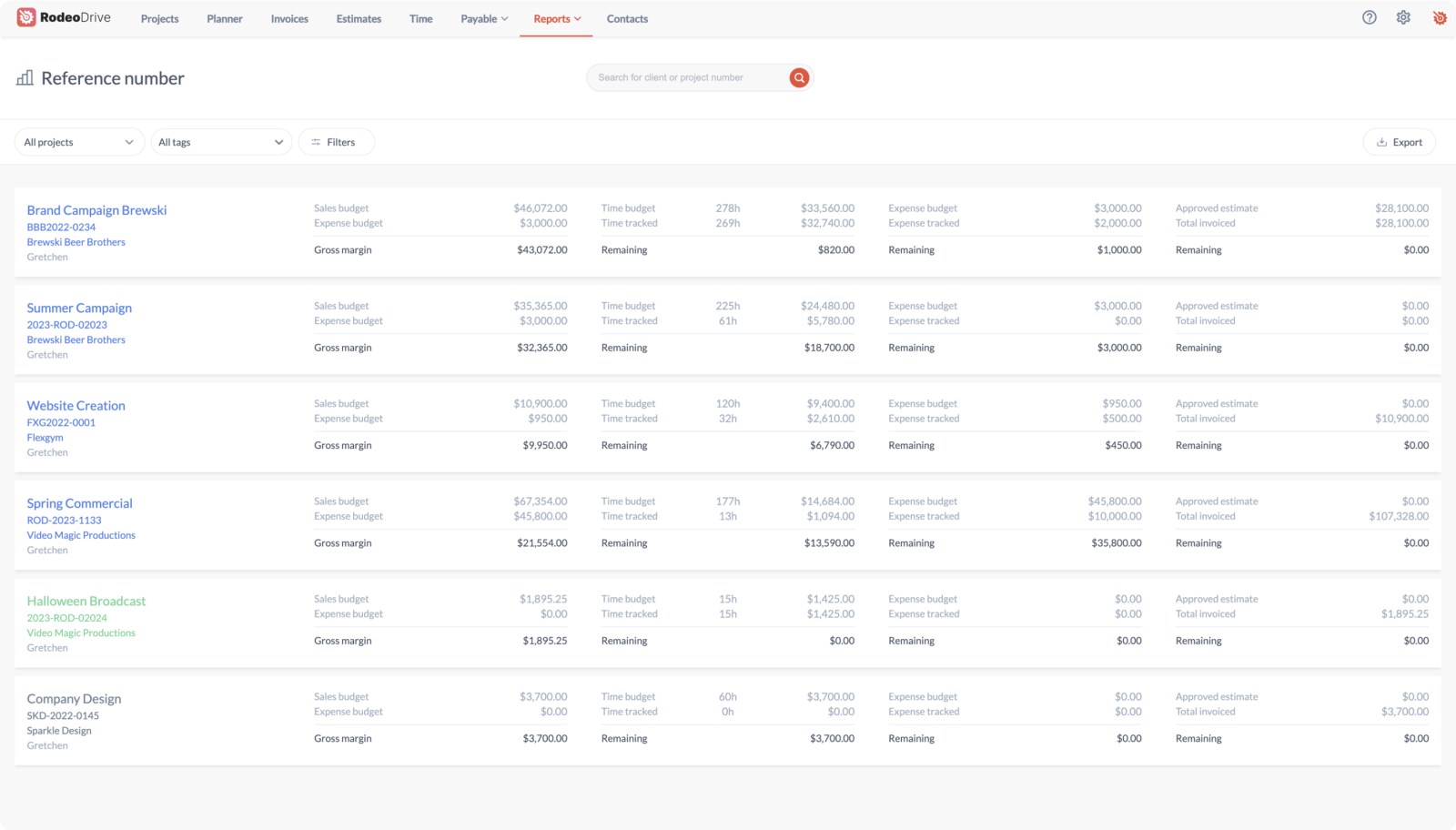
Rodeo Drive’s projects report, which provides an overview of your financials
Interested in identifying top performers and gauging team capacity for extra tasks? Rodeo Drive's productivity report offers valuable performance data, aiding informed task and responsibility allocation decisions.
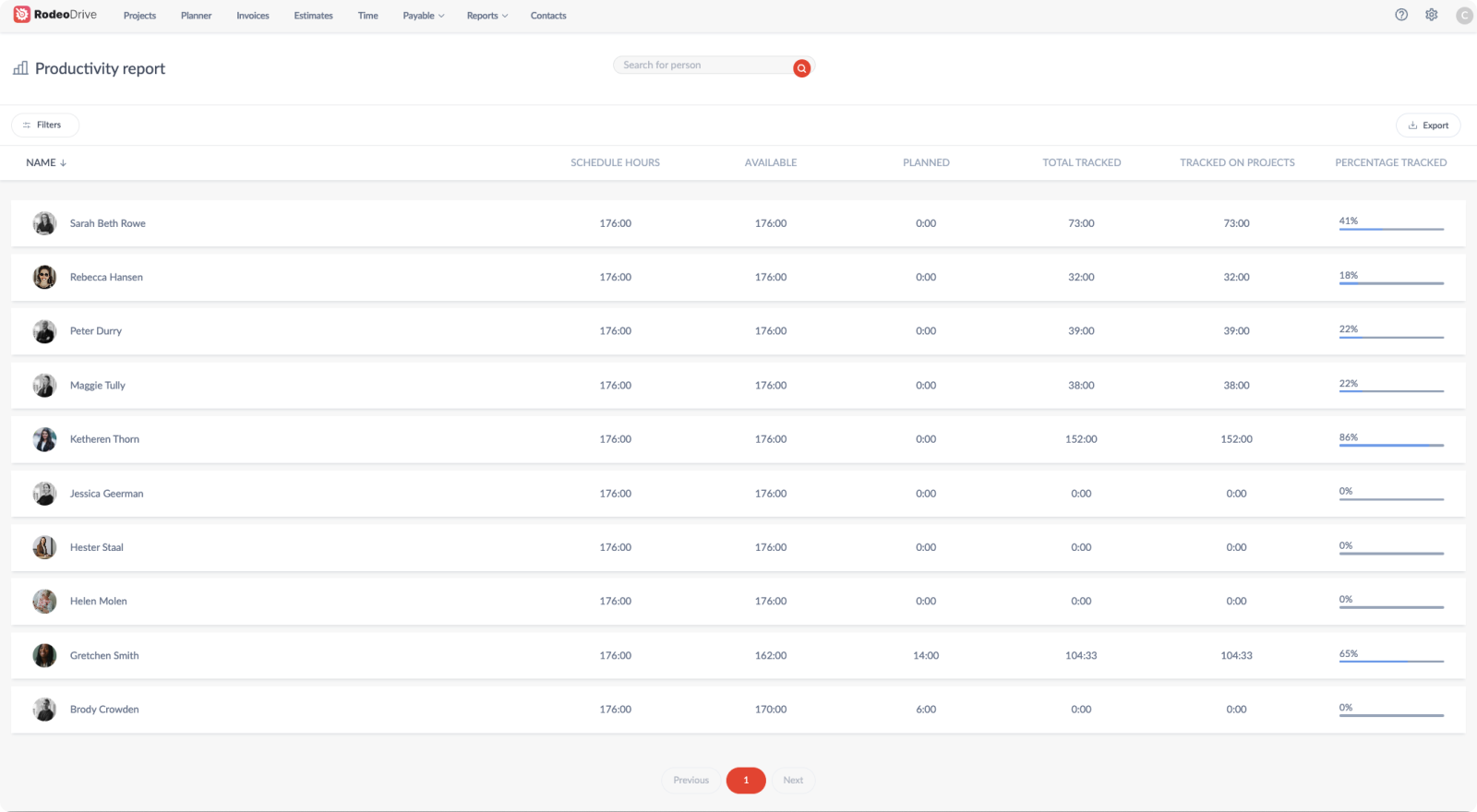
Rodeo Drive’s productivity report, which highlights each team member’s billable rate
Delve into your teammates' time cards and discover chances to boost time efficiency further using the time report feature.
.png)
Rodeo Drive’s time report, providing an at-a-glance overview of all time entries
Rodeo Drive’s additional features
- Detailed Project budgeting: Build phase-based budgets before your project kicks off so you’re able to easily monitor your spending once the project is underway.
- Quickbooks (US) and Xero (UK) integration: To assist you with your bookkeeping needs.
- Time tracking that’s connected with your budget: Accurate time tracking is essential to bill clients for the work that your team does.
- Client-ready estimates: Streamline your client budget approval process by sending estimates directly from Rodeo Drive.
- Invoicing: Create and send invoices directly from the platform in the UK and via QuickBooks integration in the US.
- Expenses & Purchase Orders: Track project expenses with your own POs.
Rodeo Drive’s weaknesses
-
There’s no mobile app yet, but it’s definitely on the roadmap to have our platform work seamlessly on multiple devices.
Rodeo Drive’s pricing
Rodeo Drive’s pricing structure is straightforward, with two options to choose from:
- Free plan: Up to 10 users, 3 active projects, time tracking, estimates and invoices, budgeting, planner
- Achiever plan ($14.99 per user/month): Everything in the free plan plus unlimited projects, custom work schedules, in-depth reports, live chat support, and guest user access
Users can also save 10% with an annual subscription. Get started for free or schedule a call with a Rodeo Drive expert to learn more about the tool.
2. Notion
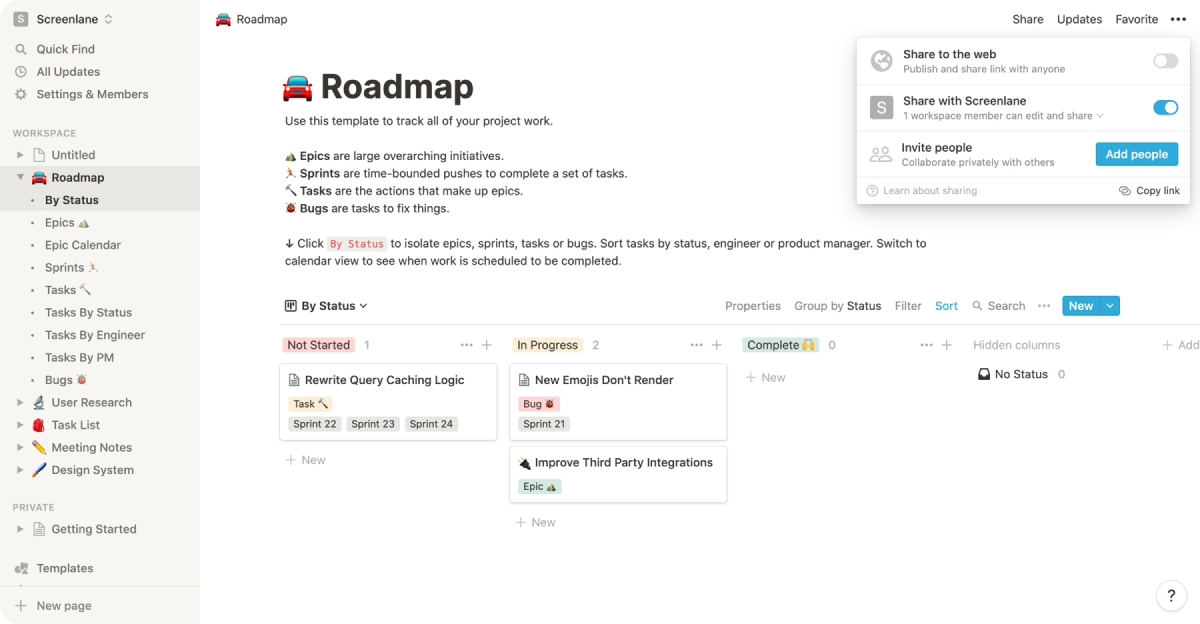
Source: Notion
While Notion isn't exclusively a project management tool, it's often used for organising tasks, projects, and collaboration efforts. Notion uses a block-based structure, allowing users to create pages, databases, calendars, and more, which can be customised to suit various project management needs.
Users can design their task boards, project timelines, and collaborative spaces within Notion. It supports task lists, kanban boards, calendars, document sharing, note-taking, and team collaboration.
Notion’s popular features
- Grammar check
- Templates
- To-do lists
- Calendar view
Notion’s weaknesses
- Users find the mobile version not as intuitive as the desktop version.
- Notion might require more setup and customisation than dedicated project management tools. While it suits lightweight project management needs, some teams may prefer software designed for in-depth project planning, tracking, and reporting.
- With so many features, you might need to factor in some onboarding time.
Notion’s pricing
- Free
- Plus: $10
- Business: $18
- Enterprise: Contact sales
3. Asana
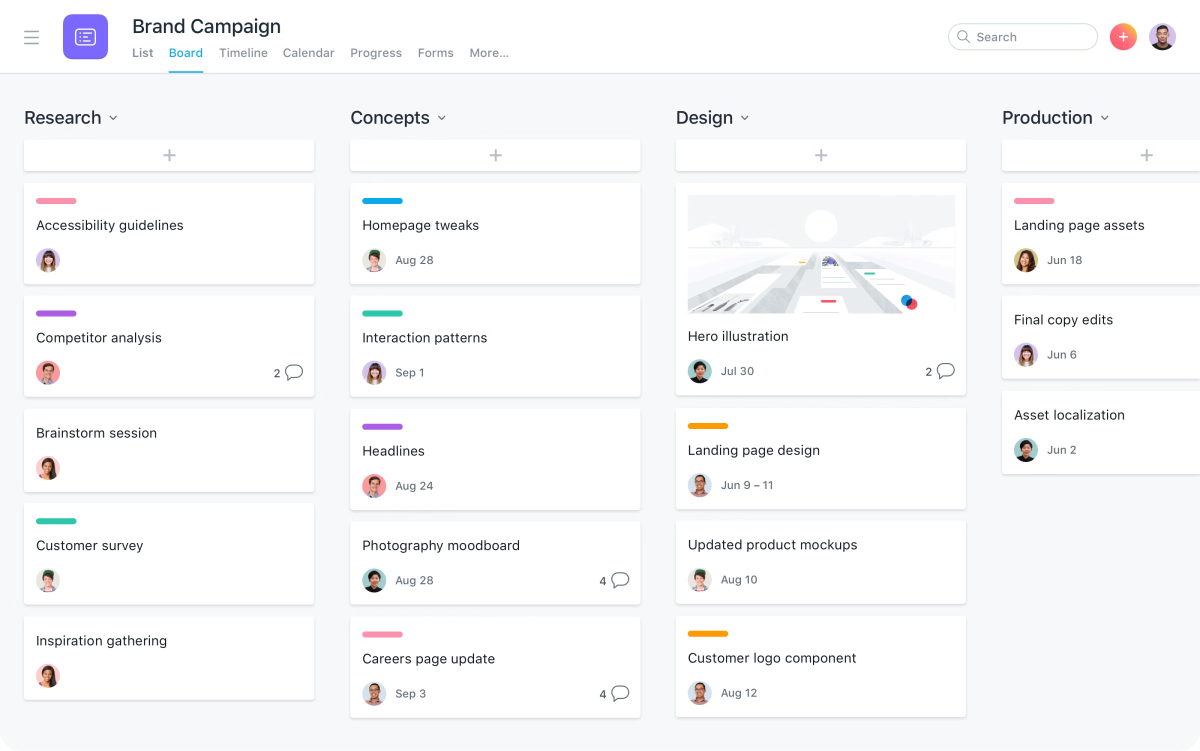
Source: Asana
Asana is a prime substitute for Milanote, excelling in task and to-do list management. The free version suits teams seeking basic task organisation and note keeping features.
The tool offers numerous integrations and a user-friendly interface, catering to expanding creative teams with additional capabilities such as viewing, prioritising, and tracking progress.
Also read: Top Asana Alternatives to Consider
Asana’s popular features
- Tasks and subtasks
- Project milestones
- Custom fields
- Task dependencies
Asana’s weaknesses
- The emails users get can feel spammy and overflow inboxes. Users need help finding where to turn off these email notifications.
- Teams looking for customisation might have to look elsewhere.
Asana’s pricing
- Basic plan: free
- Premium plan: $13.49 per user/month
- Business plan: $30.49 per user/month
- Enterprise plan: contact sales
4. Trello

Source: Trello
Trello is an effortlessly navigable tool designed for task management centred around a Kanban board framework, making the project’s progress immediately visible.
It's an excellent choice to handle to-do lists and visualise pending tasks. Users create boards with cards, including project details, files, and due dates. Tagging team members ensures a smooth task workflow.
Also read: Top Trello Alternatives for Project Management [Free & Paid]
Trello’s popular features
- Power-ups
- Timeline, table, and calendar views
- Templates
- Automations
Trello’s weaknesses
- One of Trello's shortcomings is the lack of built-in reports and analytics.
- Trello might not be suitable for creative teams working on large projects.
- The tool doesn’t offer any financial features.
Trello’s pricing
- Free plan
- Standard plan: $6 per user/month
- Premium plan: $12.50 per user/month
- Enterprise plan: $17.50 per user/month for teams of 50 users
5. Basecamp
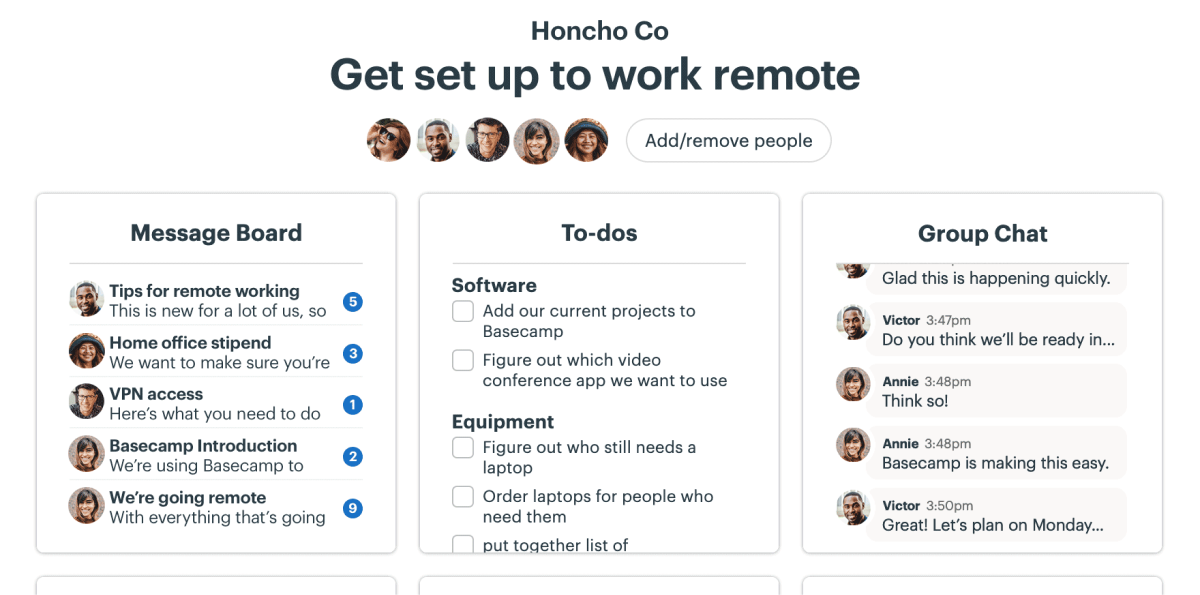
Source: Basecamp
There is no need for complicated workflows with Basecamp. The platform aims to simplify project management by providing a centralised platform for teams to coordinate their work, track progress, and communicate without extensive training or complex tools.
The tool is known for its user-friendly interface and focus on simplicity, making it popular among small to medium-sized teams and businesses. So, if you seek a straightforward project management solution, Basecamp takes the lead. It furnishes project to-do lists, an internal chatbox, and message boards for seamless communication.
Also read: Basecamp Alternatives: A Deep Dive into the Best Competitors
Basecamp’s popular features
- To-do lists
- File sharing
- Direct messaging
- Docs and files
Basecamp’s weaknesses
-
The inability to classify projects in order of importance and no option to add subtasks cause frustration for some users.
Basecamp’s pricing
- Individual plan: $15 per user/month
- Pro unlimited plan: $349 per month for unlimited users
6. Zoho Notebook
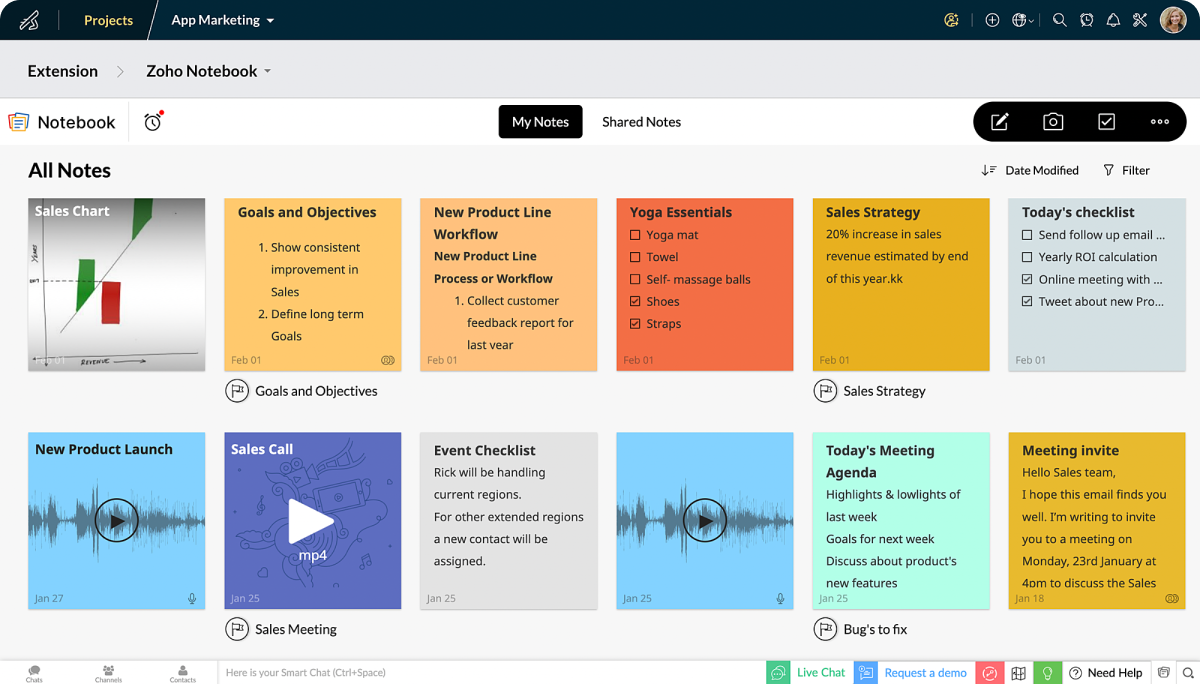
Source: Zoho Notebook
Zoho Notebook is a tool within the larger Zoho ecosystem. You may have heard of Zoho Projects or Zoho One before — these are a couple of the most well-known products under this umbrella.
In terms of capabilities, Zoho Notebook allows users to store and organise information in the format of note cards. The tool calls itself a “pocket-sized notebook” and the ability to store information via their mobile app allows them to live up to that promise.
Zoho Notebook’s popular features
- Organisable note cards
- Version history
- Notes synced to the cloud
Zoho Notebook’s weaknesses
- The software lacks options when it comes to exporting notes.
- Zoho Notebook doesn’t offer robust task management functionality.
- The tool tends to run slowly if your notes contain too much data or other information.
Zoho Notebook’s pricing
- Notebook Essential plan: Free
- Notebook Pro plan: $1.99 per user/month
7. nTask
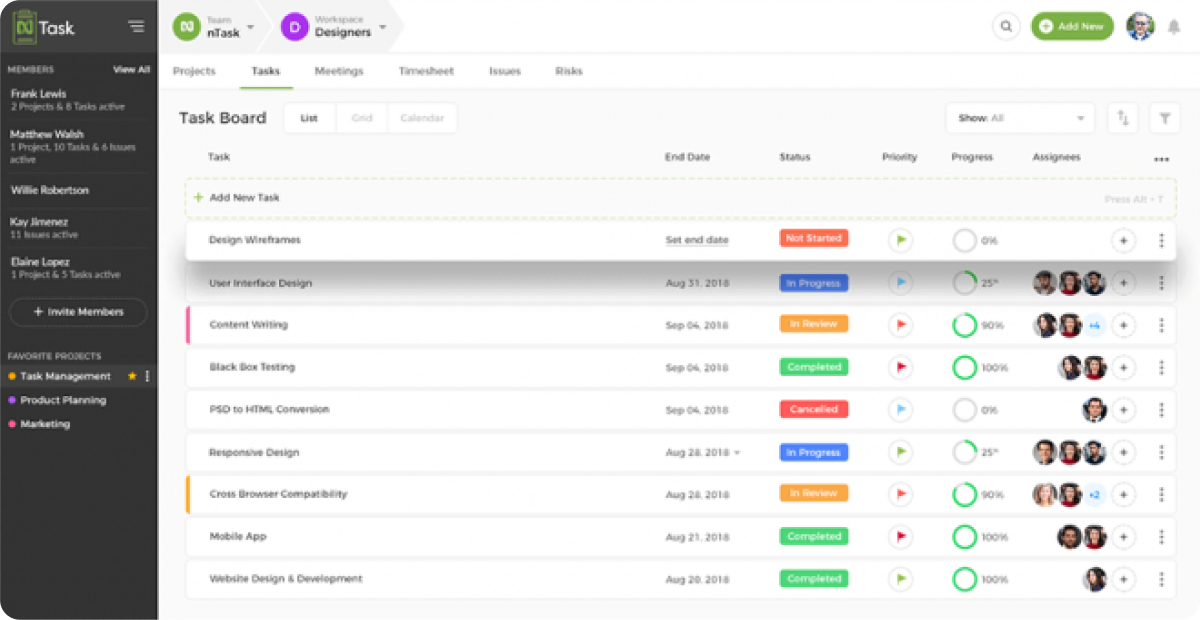
Source: nTask
If you’re looking beyond task management, nTask might be the tool for you. It offers features like issue tracking, project risk management, and meeting management, which helps it stand apart from other competitors.
nTask aims to simplify project management processes and provide a user-friendly interface, making it suitable for both small teams and individual users looking for an organised way to manage projects.
The software also offers integrations with other tools and platforms, allowing users to connect their project management efforts with other apps they use.
Related: nTask Alternatives: Your Comprehensive Guide to the Best Competitors
nTask’s popular features
- Task management
- Issue tracking
- Resource management
- Time tracking
nTask’s weaknesses
- The interface could be more intuitive, and the slow loading times might interfere with your creative workflow.
- The customer service can be quite slow.
- If you’re looking for extensive reports, you’ll have to look beyond nTask.
nTask’s pricing
- Basic plan: free
- Premium plan: $4 per user/month
- Business plan: $12 per user/month
- Enterprise plan (pricing upon request)
8. Wrike
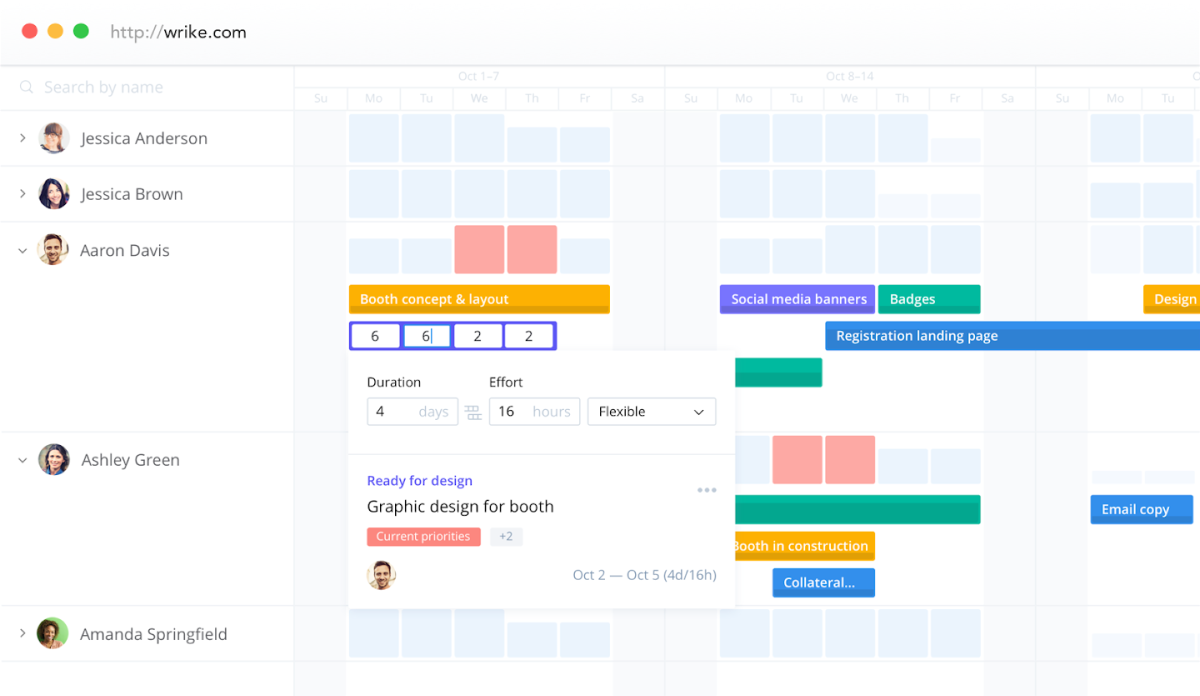
Source: Wrike
If you're searching for a project management tool that offers extensive customisation, consider exploring Wrike.
This platform provides tailored solutions for creative marketing teams — as well as design and software teams — along with beneficial features like personalised request forms, Gantt charts, and Kanban boards.
Related: Wrike Alternatives: Comparing the Top Competitors in Project Management
Wrike’s popular features
- Dashboards
- Project resource planning
- Kanban board
- Gantt charts
Wrike’s weaknesses
- Some users are not a fan of the recently updated UI, claiming it makes the platform even more complicated to navigate.
- The loading time can be long if you’re working on larger projects.
- If you wish to centralise all project communication and management in one tool, Wrike isn’t your best bet.
Wrike’s pricing
- Basic plan: Free
- Team plan: $9.80 per user/month
- Business plan: $24.80 per user/month
- Enterprise plan: pricing upon request
- Pinnacle plan: pricing upon request
9. Monday
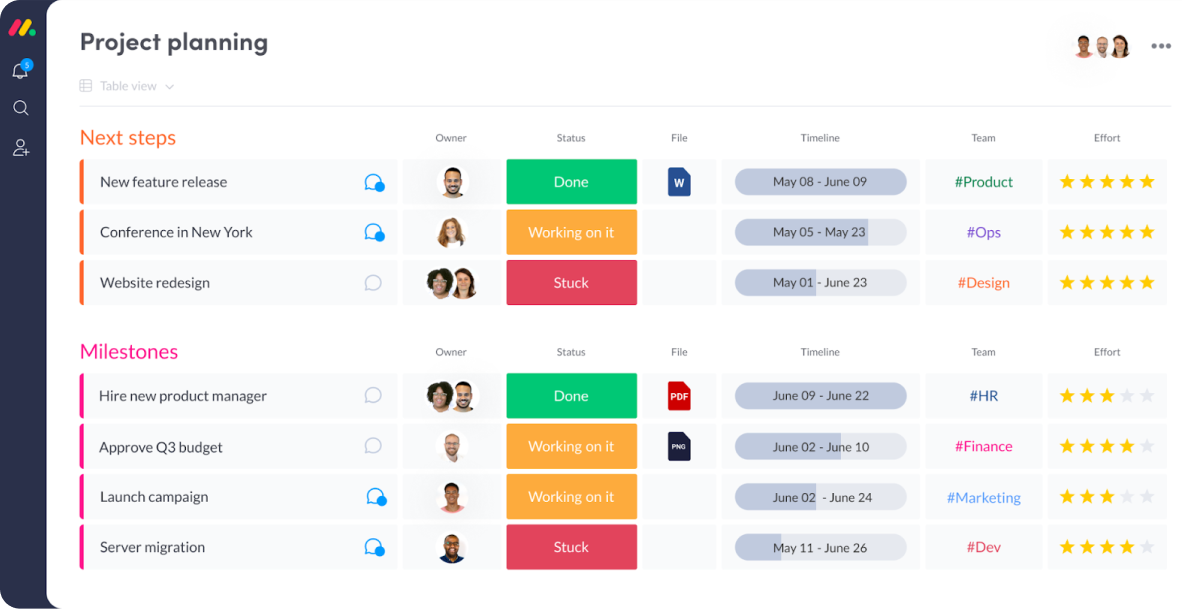
Source: Monday.com
Monday is a popular project management software that offers a visual and intuitive platform for teams to manage tasks, projects, and workflows. It is known for its customisable, colourful and flexible interface that allows teams to design their own workflows and project structures.
Key features of Monday include creating and assigning tasks, setting deadlines, tracking progress, creating project timelines, automating repetitive tasks, visualising data through customisable dashboards, and collaborating with team members through comments and file sharing.
Monday suits teams of all sizes and industries, from small startups to large enterprises. Its easy-to-use approach and wide range of integrations make it a versatile solution for project management, task tracking, and team performance tracking.
Related: Top Monday Alternatives to Try
Monday’s popular features
- Dashboards
- Real-time document collaboration
- Task planning
- Forms & automations
Monday’s weaknesses
- It can take some time for first-time users to figure out all the features and options.
- The customisation options can be a negative for teams wanting to work with a preset framework.
Monday’s pricing
- Individual plan: Free for up to 2 users
- Basic plan: $10 per user/month
- Standard plan: $12 per user/month
- Pro plan: $20 per user/month
- Enterprise plan: Contact sales
- Note: All paid plans require a minimum of 3 users.
Takeaway
Before you commit, consider what factors are most important to your creative team in a project management tool. If you’re looking for document storage, an option like Notion could be a good fit. If you require a tool that’s more focused on tasks and overall project management, Wrike would be a good option.
But if you’re looking for an all-in-one platform that offers financial features, consider Rodeo Drive. With the ability to connect your tracked time to your budgets, Rodeo Drive helps creative project managers understand their project profitability at all times.
Don’t just take our word for it. Start for free today and see it for yourself.





